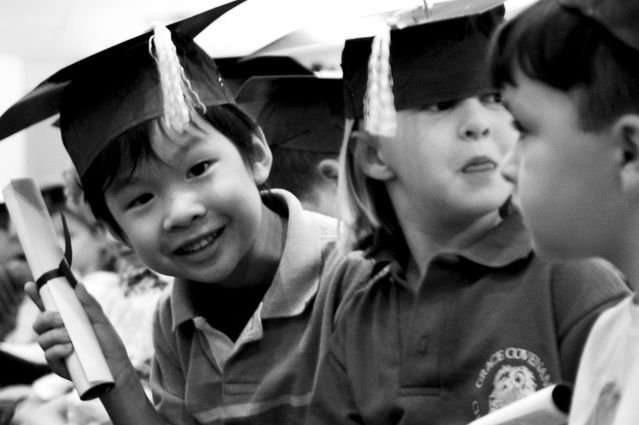Source: Gideon Tsang - Flickr. This file is licensed under the Creative Commons Attribution-Share Alike 2.0 Generic license.
Do you remember your high school or university graduation? Usually, a trip down memory lane evokes positive (and perhaps embellished) that elicit positive affect. The positive memories that are evoked from recalling important occasions have been described as feelings of nostalgia. These feelings may have an impact on attitudes.
This potential impact was recently shown by a group of psychologists from King’s College London and the University of Southampton (both in the United Kingdom). They examined whether adverse weather, such as rain and thunder, can evoke feelings of nostalgia, with potential knock on effects for outcomes such as positive affect, feelings of , and — which can be thought of as an attitude toward the self.
In their research, Wijnand van Tilburg, Constantine Sedikides, and Tim Wildschut tested a series of research questions, such as whether distress elicited by adverse weather evokes nostalgia and whether nostalgia induced by adverse weather has psychological benefits. These questions were addressed using diverse methods. For example, in one experiment, participants listened to four brief audio recordings. One recording (a baseline condition) was of a quiet parking lot. In the three remaining versions, other noises were added to the baseline sound recording – either heavy wind, heavy thunder, or heavy rain. After listening to each recording (which were presented in a random order), participants were asked to report the degree to which the recording made them feel nostalgic. The results revealed that hearing wind, thunder, and rain all led to increased nostalgia compared to the pure baseline condition. In a follow-up study using a different methodology, participants completed an online diary over the course of 10 consecutive days, where they completed measures of their perceptions of the weather (e.g., perceived levels of wind and rain), their level of distress, and their feelings of nostalgia. Building upon their initial experimental results, the researchers found that perceived wind (but not rain) increased feelings of nostalgia, as well as finding that nostalgia served to buffer any distress elicited by adverse weather. In a final study, the researchers tested the potential benefits of weather-induced nostalgia. Here, participants listened to one of the four audio recordings, before completing feelings of nostalgia and then measures assessing self-esteem, positive affect, social connectedness, and optimism. The results supported the researchers’ hypotheses – adverse weather increased feelings of nostalgia, and these increased levels of nostalgia were linked with increased feelings of self-esteem, positive affect, social connectedness, and optimism.
These findings are interesting and important for a number of reasons. At a general level, the findings add to research demonstrating the positive effects of nostalgia. They also offer new insights into the psychology of weather, and how the weather can play a role in the regulation of emotion. From our perspective as attitude researchers, these findings are interesting by further demonstrating how our self-esteem, which can thought of as our attitude toward our own self, can be influenced by situational and naturally occurring variations in our environment.

ohyesindeed on September 8th, 2018 at 05:05 UTC »
I wonder if this relates to human's strong sense of peace and well being near bodies of water. Water makes people feel safe on a subliminal level (because we need water to live) and rain storms signal water availability.
nickycthatsme on September 8th, 2018 at 03:48 UTC »
I'd be curious to see this study expanded to people who grew up in the desert or other arid climates.
mvea on September 7th, 2018 at 23:44 UTC »
The title of the post is a copy and paste from the title and third paragraph of the linked academic press release here :
Journal Reference:
van Tilburg, W.A.P., Sedikides, C., & Wildschut, T. (2018).
Adverse weather evokes nostalgia.
Personality and Social Psychology Bulletin, 44, 984-995.
DOI: https://doi.org/10.1177/0146167218756030
Link: http://journals.sagepub.com/doi/abs/10.1177/0146167218756030?journalCode=pspc
Abstract
Four studies examined the link between adverse weather and the palliative role of nostalgia. We proposed and tested that (a) adverse weather evokes nostalgia (Hypothesis 1); (b) adverse weather causes distress, which predicts elevated nostalgia (Hypothesis 2); (c) preventing nostalgia exacerbates weather-induced distress (Hypothesis 3); and (d) weather-evoked nostalgia confers psychological benefits (Hypothesis 4). In Study 1, participants listened to recordings of wind, thunder, rain, and neutral sounds. Adverse weather evoked nostalgia. In Study 2, participants kept a 10-day diary recording weather conditions, distress, and nostalgia. We also obtained meteorological data. Adverse weather perceptions were positively correlated with distress, which predicted higher nostalgia. Also, adverse natural weather was associated with corresponding weather perceptions, which predicted elevated nostalgia. (Results were mixed for rain.) In Study 3, preventing nostalgia (via cognitive load) increased weather-evoked distress. In Study 4, weather-evoked nostalgia was positively associated with psychological benefits. The findings pioneer the relevance of nostalgia as source of comfort in adverse weather.